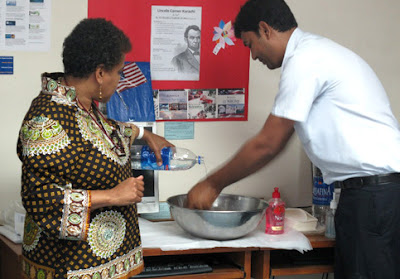Global Handwashing Day was October 15, so, in keeping with the Southeast Asian time scheme, we celebrated it on October 21. Things are always a bit slower in this part of the world. Anyway, my health unit was asked to “participate” in a program sponsored by the consulate and our public affairs office. We were told there would be presentations to an audience of nursing students selected from various hospitals around the city.
The time was set for Friday morning and, since that is the time I routinely supervise vegetable sanitizing—not to mention that I don’t speak the local language—Mehroon, my Urdu-speaking colleague, volunteered to represent our office. We only heard about this event a week before it was scheduled and, three days before it was to happen, we were told the presentation—now singular—was us!
Mehroon and our computer-whiz administrative assistant put together an amazing PowerPoint presentation, complete with videos from Centers for Disease Control, to drive home the point that hands spread germs and germs make people ill. The presentation especially focused on hand washing prior to touching patients in the hospital and how microbes can be spread from one patient to the next by staff members who are not particular about hygiene.
 |
| Mehroon teaches proper handwashing technique. |
Mehroon strongly encouraged the nursing students to remind family members, hospital staff and—gasp!— physicians to remember to wash hands or use hand sanitizer between patients. Evidently, there was a bit of worried discussion about the latter suggestion. Sure, it is reasonable to instruct families and other staff members might be amenable, but the physician? The students were absolutely sure that offering this suggestion to the physician would not be tolerated.
I’ve been in medicine for a long time, and I remember those days—not that they are completely gone—when physicians were at the top of the heap, and no one dared to suggest or question. Most of the docs I know now think that type of isolated existence is lonely and not very safe, and they welcome rapport with the health care team. It is a worthy concept, and I hope some of these nursing students take the dare and mention what they learned for Global Handwashing Day, maybe even to a physician.
For Reflections on Nursing Leadership (RNL), published by the Honor Society of Nursing, Sigma Theta Tau International.



